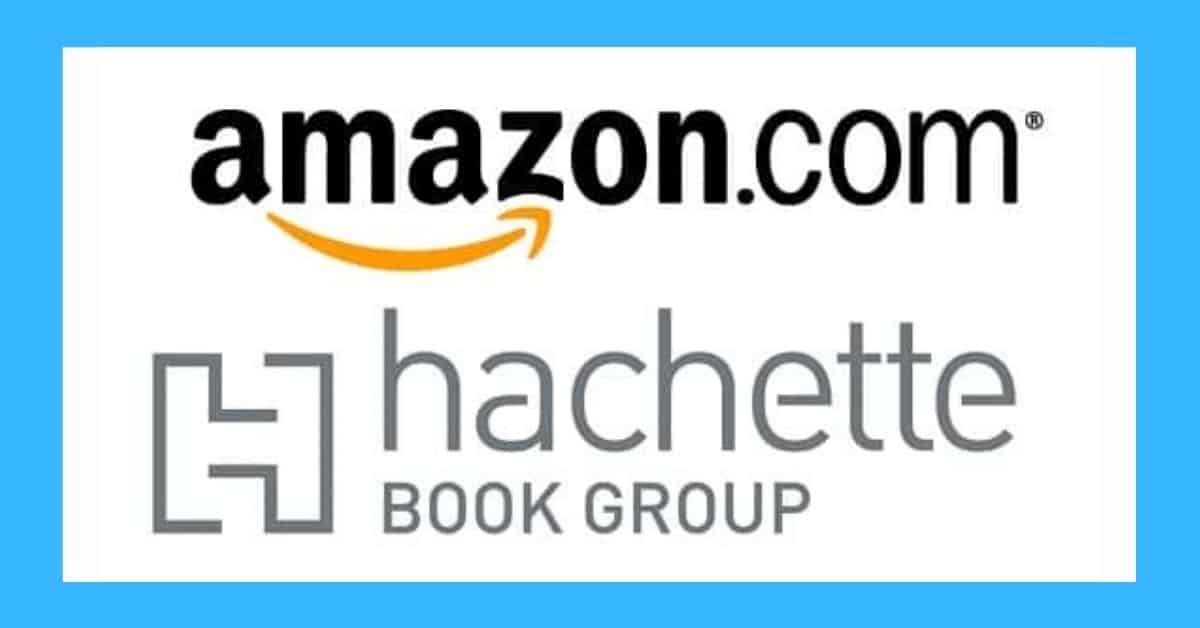There is so much crap being spouted in this anti-Amazon media push that you need a nose-peg and waders to get through it all. Let’s take a look at what happened this week.
This post is from 28 June 2014. It has not been updated except to clean up broken links but the comments remain open.
Hook, Line & Sinker
Statements from either side in the Amazon-Hachette dispute have been thin on the ground. Both companies are said to have signed NDAs – restricting formal comments while negotiations are ongoing – but Hachette has been leaking to reporters, and marshaling authors and industry figures in its defense, leading to an extremely one-sided depiction of events in the media.
Which is fine, it’s a pretty standard negotiation tactic, and a clever one if media conglomerates like Bertelsmann (part-owner of Penguin Random House), CBS (owner of Simon & Schuster), and NewsCorp (owner of HarperCollins and Harlequin) are rooting for your team.
What concerns me is that media outlets – even those not in the same corporate family as those publishers with a vested interest in the outcome – are taking the Hachette leaks as the complete and unvarnished truth.
On Tuesday, the New York Times reported that Amazon is demanding payment for pre-orders and other facilities and services it previously provided to Hachette for free. This story was leaked by “someone involved on the Hachette side of the negotiations, who is under orders not to discuss them and asked not to be named.”
Then this Guardian story – New Amazon terms amount to ‘assisted suicide’ for book industry, experts claim – got a lot of traction on Thursday. It was primarily based on a piece in The Bookseller on Wednesday (the editor of which is the “expert(s)” in the Guardian headline). That article was wholly based on leaks from publishers, none of which were treated to any skepticism or critical analysis.
Does anyone see the problem here?
Reporters are supposed to aim for some kind of objectivity (or be open about their subjectivity), but that’s not happening here at all. The only attempt at balance has been to ask Amazon for comment. Naturally, Amazon has refused as it’s currently restricted from commenting because of those NDAs.
This leaves a reporter with two choices: run the unbalanced piece as is, or attempt some critical analysis on their own. I’m not a reporter, but I can think of any number of scenarios where Amazon could be asking for an increased percentage of e-book sales, or wants to start charging for pre-orders, which doesn’t mean that the world is ending and Jeff Bezos eats babies.
Here are two plausible scenarios.
I haven’t seen any such critical analysis of these Hachette leaks because most of the media coverage of this dispute seems to start with the premise that Amazon is Evil and then works from there. I have no problem with Amazon being subjected to scrutiny. It should be subjected to scrutiny! What I have an issue with is large publishers not being subjected to any scrutiny whatsoever, even for the most abhorrent behavior.
This lack of scrutiny seems to have created an underlying assumption in media reports that publishers are trying to do the right thing, and Amazon is an amoral (or immoral) corporation which will happily burn down the book business if it means it can sell razor-blades more efficiently.
Pro Amazon?
Amazon is such a hot-button issue that even when you write a piece asking for patience before jumping to conclusions, that’s painted as a “pro-Amazon” post – which says a lot about the people making such designations. For whatever reason, their views on Amazon are so one-sided that they are incapable of seeing any nuance.
For the record, I’m neither pro-Amazon or anti-Amazon. I have a reasonably positive disposition towards them as a customer and as a supplier because its actions have tended to be pro-reader (e.g. reducing prices) and pro-author (e.g. paying 70%, creating a more level playing field than other retailers).
But I also know that Amazon is a business and a (very) large corporation and will ultimately only look out for itself – like all corporations do, which is their fiduciary duty to their shareholders. I have had no problem criticizing Amazon in the past when I felt it deserved it (e.g. the dumb, regressive Whispernet Surcharge or the worrying precedent of non-fixed payments in KDP Select).
So I don’t blindly “trust” Amazon (whatever that means). I adopt the appropriate level of skepticism to all companies in the fetid swamp that is publishing and, increasingly, to news reports on the business too.
Amazon and Tax
It’s amazing what can happen when you start to question the anti-Amazon talking points in the media (which I suspect is the result of the astroturfing that publishers admitted to engaging to in January).
Let’s take the issue of Amazon and tax, for example, which is a recurring story in the media. I actually have some sympathy with Amazon’s critics on this issue. But it’s far more complex than it has been presented by journalists who have consistently reported this in an inaccurate and unhelpful way.
I’m going to focus on corporation tax specifically because I think that’s the real issue here and the one that newspapers, politicians, and the public seem to focus on.
It’s common for reports to state that Amazon generated X in revenue and only paid Y in tax. This is not how corporation tax works. Corporation tax is levied on profits. Amazon doesn’t make that much profit because it reinvests most of its money in aggressive expansion.
Doing so isn’t a tax dodge. Indeed, given the current economic climate, we should be encouraging companies like Amazon who reinvest in expansion, as opposed to companies like Apple who are sitting on a giant pile of cash and not doing very much with it (except not bringing it home where it might be properly taxed).
That misunderstanding of corporation tax aside, Amazon stands accused of using various corporate structures to minimize its tax bill further – and that’s what I want to look at in detail, because there is a case to answer here.
I have no problem with anyone organizing a boycott against Amazon on these grounds. But to be consistent, you would also have to boycott Google, IBM, Pfizer, Microsoft, General Electric, Facebook, Apple, Starbucks, Yahoo, Oracle, Johnson & Johnson, Adobe, and U2.
The corporate structures in question take various forms, but the most popular are the Double Irish and the Dutch Sandwich (usually used in conjunction with each other). This tax reduction approach was pioneered by Apple in the 1980s and quickly became popular among tech companies before spreading into other industries.
The recently announced EU investigation into Irish corporate tax affairs is starting with Apple (plus Starbucks & Fiat), but it would be a huge surprise if it stopped there because the above list of companies is just the tip of the iceberg.
A truly consistent and non-hypocritical boycott would include avoiding virtually all tech companies and most large, international companies who all use a variety of “creative” ways to reduce their effective tax rate to near-zero.
I’m not saying we should do nothing. I think large companies should pay their fair share. But I think tackling this issue requires coordinated inter-governmental action to truly stamp out this practice – otherwise it’s going to keep moving from one jurisdiction to another.
On a personal level, I’m embarrassed by my own government for (a) being a prime mover in this whole system, (b) lying about it, and (c) hiring expensive lawyers to fight the investigation after they were caught (when the country is completely broke and the healthcare system is falling apart).
I get that people want to do something about this issue, but I respectfully submit that targeting Amazon or any of the companies above is pointless. They aren’t breaking any laws. These are legal loopholes, often specifically created for the companies by the governments in question to attract foreign investment. (Note: the EU investigation is to see whether certain countries broke EU rules with regard to state aid, not whether any of the companies have broken the law.)
I would also respectfully suggest that if you genuinely want to do something about this, write to your local politician and explain how this system works because many of them simply don’t know. The complexity of the structures, and the inaccuracy of the reporting, allows the respective governments to be extremely disingenuous with their statements. Point your local politician to the articles linked to above.
In other words, if you want to do something about, then actually do something about it. But it’s a pretty dumb reason to bash Amazon or organize boycotts targeting Amazon exclusively.
And while we’re on the topic, I wouldn’t be terribly surprised if large publishers used the same tactics to reduce their own tax bills, especially given that Harlequin used similar corporate structures to reduce e-book royalty rates it paid certain writers on older contracts from 50% to 3-4%.
The difference between Harlequin’s behavior and Amazon’s (and the other companies named above) is that Harlequin may have actually broken the law with this sleight of hand. It’s currently the subject of a class action suit by the affected writers. Indeed, I should note that the Plaintiffs claim that Harlequin’s Swiss subsidiary was “created for tax purposes.”
The exposure in this suit – which was reinstated in May – is said to be a key reason why Harlequin’s former owner, Torstar, suddenly sold the company to HarperCollins.
Penguin Random House has its own class action to deal with of course, and one of its parent companies, Pearson – which owns 49% of PRH – has had its own tax troubles in the past which led them to paying $7.7m in a settlement with the New York Attorney General in December last year.
None of that got much play in the news media – which also gave the respective publishers a pass (including Hachette) for illegally colluding to fix the price of e-books. I guess it doesn’t fit the “Publisher Good, Amazon Bad” narrative.
Writers should be a little more careful before jumping on the bandwagon.


